 Welcome to the first Linux in the Ham Shack for the new year! 2011 is upon us and we wanted to present our listeners with a fantabulous new show. That's what you're going to get. We were able to entice the lead developer of FLDIGI, W1HKJ, to come on the program and give us his personal insights into this best-of-class Open Source amateur radio software.
Welcome to the first Linux in the Ham Shack for the new year! 2011 is upon us and we wanted to present our listeners with a fantabulous new show. That's what you're going to get. We were able to entice the lead developer of FLDIGI, W1HKJ, to come on the program and give us his personal insights into this best-of-class Open Source amateur radio software.
Yes, we know we talk about FLDIGI a lot in our program. We try not to beat it to death. But if you use this program, there is so much information packed into this interview, you're going to learn at least a dozen things you didn't know about FLDIGI, even if you use it every day. So sit back, strap in, and join us on this thrill-packed ride into the dark and seedy innards of your favorite digital mode app. We were impressed; you will be too.
73 de The LHS Guys
Podcast: Play in new window | Download